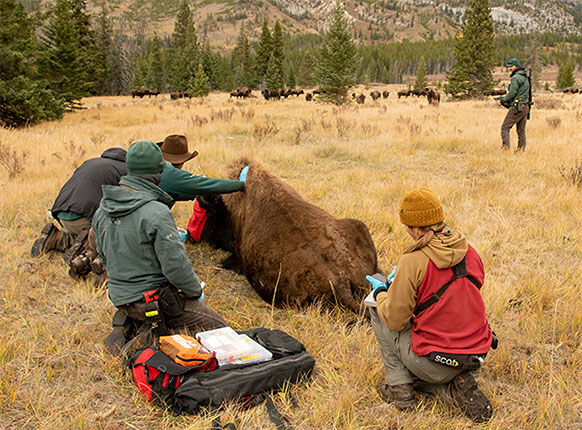No Slides Entered.
New Biodiversity Institute Graduate Research Assistant
Salma is a University of Wyoming Masters student studying Natural Science Education and Environment and Natural Resources.
This last winter was her first time seeing snow while at the Teton Science School (TSS) for her first year of graduate school. She was born in Mexico City and grew up in La Paz, Baja California Sur and studied marine biology in undergrad. Her instructors saw her passion in biodiversity and encouraged her to continue her graduate education at the University of Wyoming as they were UW alumni themselves. She loved her time in at the Teton Science School and getting to know Grand Teton National Park and the Mountain West. Salma also spent one month between Yellowstone National Park and Missoula, Montana where she helped a non-profit in Yellowstone develop their field education programs for her spring practicum. She just moved to Laramie, Wyoming at the start of August to begin her second year of graduate school at the Laramie campus.
"For my second year, I was encouraged to apply for this [Biodiversity Institute Graduate Research Assistantship]. When they told me I got it, I just said Hurray!," Salma recalls.
“In the next year I’m interested in developing amphibian, mammal, and bird lesson plans to go along with the existing [Biodiversity Institute] activities. So teachers and classrooms who visit the Institute can use them, or even teachers who are in other parts of Wyoming can take those lesson plans and apply them to their school rooms. There are programs like the Western Salamander Migration Nights where people volunteer to help salamanders cross the road, or the Moose Day program that could use lesson plans to go alongside it."
When completed, those lesson plans will be available for free for Wyoming teachers and other educators who want to utilize them. Existing educational material can be viewed here.
Salma says she's passionate about K-12 education, because, even though Wyoming is rural, "there is still so much to protect here. One way to protect wildlife is to empower the current and next generations because they're the generation who can make changes. They can connect with these experiences [the lesson plans] and have that knowledge and experience for the rest of their lives. I'm passionate about place-based education with wildlife conservation because I feel like with the loss of biodiversity one of the more effective ways to decrease the loss of biodiversity is to teach and empower the next generation."
Share This Post

Social Media
Latest News



Archives
- All
- February 2026
- January 2026
- December 2025
- October 2025
- August 2025
- July 2025
- June 2025
- May 2025
- April 2025
- March 2025
- February 2025
- January 2025
- November 2024
- October 2024
- September 2024
- August 2024
- July 2024
- June 2024
- May 2024
- April 2024
- March 2024
- February 2024
- January 2024
- December 2023
- November 2023
- August 2023
- July 2023
- April 2023
- September 2022
- August 2022
- July 2022
- June 2022
- May 2022
- April 2022
- March 2022
- February 2022
- January 2022
- December 2021
- November 2021
- October 2021
- September 2021
- August 2021
- May 2021
- April 2021
- March 2021
- October 2020
- August 2020
- July 2020
- January 2020
- March 2019

